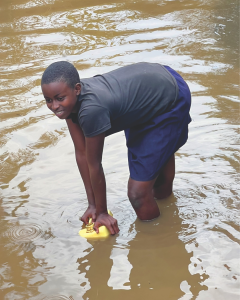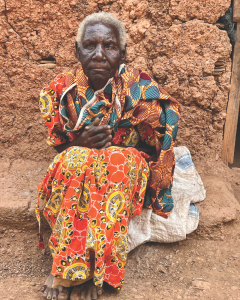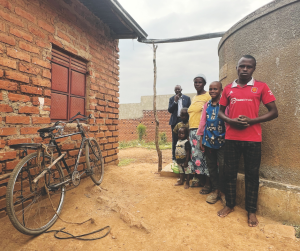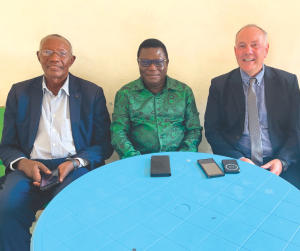Give Water Give Life
This Christmas we are focusing on helping our global partners to provide safe water.
Over 1.4 million people in developing countries, mainly children, die each year from diseases caused by lack of safe water for drinking, for hygiene, and/or for sanitation – World Heath Organisation (WHO)
The lack of clean safe water leads to diarrheal diseases, including cholera, dysentery, hepatitis, polio, disease outbreaks and malnutrition that may stunt both physical and mental development – particularly amongst children. WHO argue that better water, sanitation, and hygiene could prevent the deaths of around 1,000 children under 5 per day
"But let justice roll on like a river" Amos 5:24
Water We Would Never Drink
 While in Southwest Uganda, Isingiro is a land of natural beauty, countless families here grapple with the devastating effects of poverty and the ongoing impact of HIV/AIDS, which has claimed the lives of many parents and left children vulnerable. Ashaba, a young girl from Rwendama village in Isingiro, is one such child. A Primary Four student at Kamuri Compassionate School, Ashaba lost her father, Mr. Naboth Atuhirwe, and is now raised solely by her mother.
While in Southwest Uganda, Isingiro is a land of natural beauty, countless families here grapple with the devastating effects of poverty and the ongoing impact of HIV/AIDS, which has claimed the lives of many parents and left children vulnerable. Ashaba, a young girl from Rwendama village in Isingiro, is one such child. A Primary Four student at Kamuri Compassionate School, Ashaba lost her father, Mr. Naboth Atuhirwe, and is now raised solely by her mother.
Access to clean water for both is a daily challenge. The nearest source lies two kilometres from Ashaba’s home, but during the dry season, she must walk up to four kilometres to reach a reliable (yet also unclean) supply. Faced with this exhausting journey, many families resort to collecting water from shallow holes or makeshift dams they’ve dug themselves. These sources are often contaminated—shared with livestock that drink from them and leave waste behind, sometimes directly in the water.
A Long Suffering Elder
 This is Gencwenkye Molly (known as Molly). At 91 years of age, she lives in Nyakitunda village, Isingiro. Molly has had a challenging life. Of her four children, one child was killed by a crocodile at river Kagera when fetching water, and another died from dehydration, caused by diarrhea. The surviving children (Molly’s grandchildren) had no option but to live with their grandmother.
This is Gencwenkye Molly (known as Molly). At 91 years of age, she lives in Nyakitunda village, Isingiro. Molly has had a challenging life. Of her four children, one child was killed by a crocodile at river Kagera when fetching water, and another died from dehydration, caused by diarrhea. The surviving children (Molly’s grandchildren) had no option but to live with their grandmother.
Molly’s village is at the top of the hill, with the nearest water being a three kilometre walk over stony ground in bare feet. During the dry season they have to go more than five kilometres to river Kagera.
One of our goals this year is to ensure a water tank is build for Molly.
"Water is the major problem of this community. You have given us life"
 “The people of this area are Banyankole Bakiga by tribe, whose main activity is farming. We get our household income from crops. Our income is very low compared to the needs of our families. Most of our people get income from casual labour where one is paid 3000 shillings (1.00 USD) for a whole day. Other income was earned from banana sales, but our plantations were affected by bacterial wilt, which increased our income problems. Due to our topography, water shortage is a problem which leaves our health prone to many challenges and diseases. These hills have no watersources. We only get water from down the hills which is about four kilometres from here. We sometimes travel for water during the dry season. Throughout this period, safe water can only be got from River Kagera which borders Tanzania. As a result, our wives are raped on the way, our children are defiled, others are kidnapped or killed.” – Mr Mugizi Sedurack: CCS Volunteer Team Leader Ishingisha
“The people of this area are Banyankole Bakiga by tribe, whose main activity is farming. We get our household income from crops. Our income is very low compared to the needs of our families. Most of our people get income from casual labour where one is paid 3000 shillings (1.00 USD) for a whole day. Other income was earned from banana sales, but our plantations were affected by bacterial wilt, which increased our income problems. Due to our topography, water shortage is a problem which leaves our health prone to many challenges and diseases. These hills have no watersources. We only get water from down the hills which is about four kilometres from here. We sometimes travel for water during the dry season. Throughout this period, safe water can only be got from River Kagera which borders Tanzania. As a result, our wives are raped on the way, our children are defiled, others are kidnapped or killed.” – Mr Mugizi Sedurack: CCS Volunteer Team Leader Ishingisha
Charles and CCS
Charles Rwabambari serves as the Coordinator for the Centre for Community Solidarity (CCS) based in Isingiro. He holds a Post Graduate Diploma in Water and Sanitation Engineering. Around 2008, in Nairobi he met and immediately connected with John Gould (an environmental tutor at Lincoln University) at a conference focused on water. John was also an active part of Christian World Service (CWS).
Since that time, CWS has partnered with Charles and CCS to assist in raising funds for building rainwater tanks in Isingiro. To date, over 1500 rainwater tanks have been built through our collective efforts. Charles is passionate about clean water and the need for village people in the hills of Isingiro to have access to it. The locals refer to him as “Grandfather” or “Elder Charles”. He advises that there is good rainfall during two rainy seasons each year; however, there is little water available nearby for villagers who live remotely in the small settlements scattered throughout the hills.
Due to the scarcity of water, both women and children must walk, oftentimes many kilometres, to get to underground springs, or to rivers in the valley. Then they cart the muddy water back up the hills in very heavy jerrycans, which are carried on their heads.
This process involves much time and prevents children from getting to school. It also impacts on the ability of mothers to care well for their children, or to provide food at mealtimes, or to raise enough income to survive. Apart from being exhausting, the task of collecting water is dangerous. Not only can they face animal predators, they often have to fend off physical and sexual advances from locals who are often addicted to alcohol.
Most families in Southwest Uganda live in a simple two room, mud brick home which has a corrugated iron roof. By adding guttering and a water storage tank, the rainwater can be harvested. It is fresh and safe for cleaning, cooking and drinking, without the need to walk long distances. Excess water is also able to be used for watering crops that are planted around people’s homes.
Pictured: On a recent visit to Uganda Rev Dr Tim Pratt met with (middle) Norbert Mao (Ugandan Minister of Justice) and Charles Rwabambari (left).
Water Facts
- Only 73% of the global population have access to safe drinking water.
- 1.46 billion people, or 18% of the global population must walk up to 15 minutes to access safe drinking water.
- A further 292 million people, or 3.7% of the global population must walk between 15 and 30 minutes to access safe drinking water.
- A further 296 million people, or 3.7% of the global population have access only to unprotected water which risks contamination.
- 156 million people have access only to water with high risks of contamination.
Source: WHO/UNICEF Joint Monitoring programme for Water
Supply, Sanitation and Hygiene, 2024.
The CWS Christmas Appeal has been a tradition in New Zealand churches since 1945 when the first Christmas Bowl appeal was launched to raise funds for post-war reconstruction in Greece. Together we have supported millions of people through conflict and disaster. We have helped them improve their lives and livelihoods. Your donations have funded our local partners to strengthen communities in their efforts to end violence and promote human rights and peace. Thank you.


